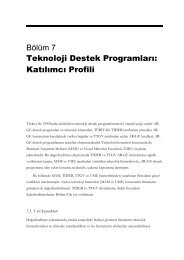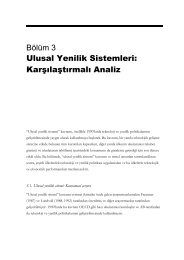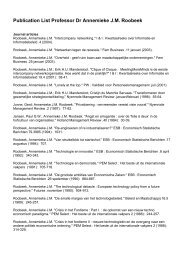Libro Blanco Vol I en Ingles
Libro Blanco Vol I en Ingles
Libro Blanco Vol I en Ingles
You also want an ePaper? Increase the reach of your titles
YUMPU automatically turns print PDFs into web optimized ePapers that Google loves.
TOWARDS A NATIONAL INNOVATION STRATEGY FOR COMPETITIVENESSVOLUME 1THE CULTURAL CONTEXT“If we have learned anything about the history of economic developm<strong>en</strong>t, it is that culture makes all thediffer<strong>en</strong>ce. (Max Weber was right in this)” 26 , states professor David Landes, of Harvard University, subtlyemphasising “all the differ<strong>en</strong>ce”. This is because there undoubtedly are theoretical principals that reoccur moreor less rigorously indep<strong>en</strong>d<strong>en</strong>tly of the focus of analysis, but it is those particular issues that make economics asocial sci<strong>en</strong>ce that cannot escape the vicissitudes characteristic of the human condition and which make themarket no more and no less than an intricate network of human relations.The unavoidable culture is knowledge and the arts, lifestyles and customs, sci<strong>en</strong>tific and industrialdevelopm<strong>en</strong>t. It is as much a way of understanding consumption as a way of managing the human resources of acompany. Culture is a defining marker of an era, as well as the living record of social evolution. It is,simultaneously, a snapshot of a group as well as of a nation.Thus understood, culture defines the way in which markets and the State develop, how they areperceived and how people choose to express their participation within it. This explains why each country –andev<strong>en</strong> region within a country- has its own business culture, its work culture or consumption culture: to get anidea of whether a community is prepared to increase its wealth, you have to find their stories, the myths theyhold, the heroes they admire, the metaphors they use, because economic developm<strong>en</strong>t is by its very ess<strong>en</strong>ce acultural process 27 .Certainly, iinnovation is no exception, thus the wide-ranging attitudes found on the issue throughout theworld and, above all, the great variety found among countries in the design of public policies that foster orfacilitate innovation activity 28 .In Chile, one of the first factors working against a good performance in this aspect is precisely the lack ofawar<strong>en</strong>ess regarding the importance of innovation and of the factors that form its foundations, a culturalrestraint that blocks the view beyond what has always defined the way of being and understanding and doingthings. This appreciation seems to be supported, for example, by the relative unimportance giv<strong>en</strong> to sci<strong>en</strong>ce andtechnology in the primary and secondary education of our stud<strong>en</strong>ts.One of the first factors that should betackled to str<strong>en</strong>gth<strong>en</strong> innovation in Chile isto massively increase the awar<strong>en</strong>ess in thecountry regarding the imperative need toinnovate.26 Landes, David. La riqueza y la pobreza de naciones. Javier Vergara Editor. Arg<strong>en</strong>tina 1999.27 Chamlee-Wright, Emily and Don Lavoie. Cato Policy Report.28 B<strong>en</strong>av<strong>en</strong>te, José Miguel. Anteced<strong>en</strong>tes para el diseño de una política tecnologica nacional. 2004.61




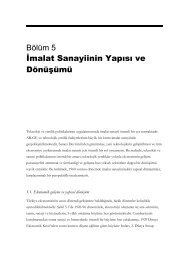
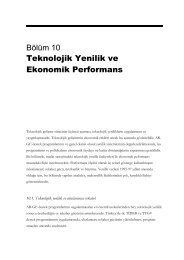

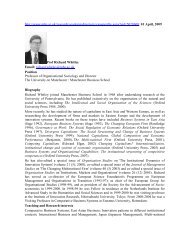




![[Tam] Uygula[ya] - Bilim, Teknoloji ve Ä°novasyon Politikaları TartıÅma ...](https://img.yumpu.com/36820041/1/184x260/tam-uygulaya-bilim-teknoloji-ve-anovasyon-politikalara-tartaama-.jpg?quality=85)
